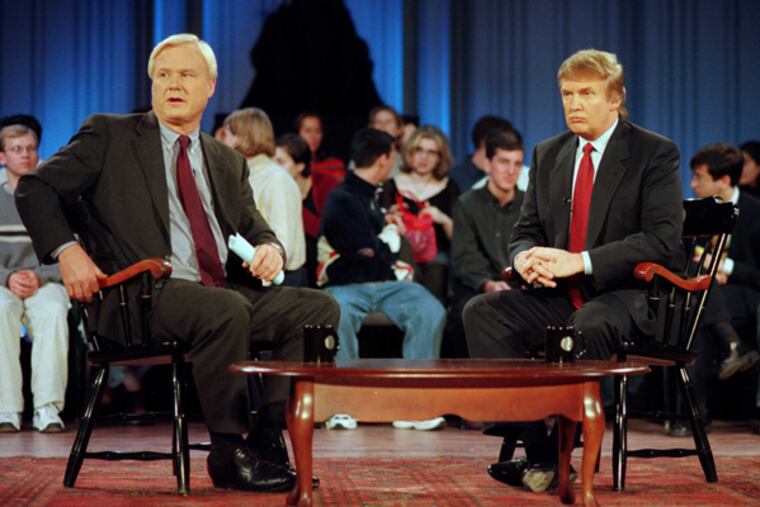Book details Trump’s use of the N-word, Twitter, and the Penn moment that foreshadowed his presidency
A book about his rise, released last week, argues that Trump’s ascent was not accidental, but rather carefully planned since as early as 1999.

Donald Trump’s election as president shocked a lot of people — pollsters, reporters, and voters who thought Hillary Clinton had the race in hand and saw Trump as an impulsive, unconventional candidate who ultimately lucked into the job.
A new book, though, argues that Trump’s ascent was not accidental, but carefully planned since as early as 1999. The Method to the Madness, written by Allen Salkin and University of Pennsylvania alumnus Aaron Short, traces how Trump’s early experience with New York City tabloid reporters, the Reform Party movement, and national exposure on The Apprentice schooled him in mastering the media, populism, and showmanship.
The book is an oral history compiled almost entirely from interviews of 141 people. Here are a few takeaways.
Trump talked about a presidential run in a 1999 interview at Penn
In November 1999, Penn student Theodore LeCompte wrote to MSNBC producers suggesting they shoot an episode of Hardball on campus. The show, hosted by Chris Matthews, proposed Trump, a 1968 graduate of the Wharton School, as a guest.
About 1,200 students attended the taping at Irvine Auditorium. Trump brought his then-girlfriend, Melania Knauss. She sat in the audience with his son Donald Jr., who at the time attended Penn.
Matthews asked Trump if he was going to run for president on the Reform Party ticket.
The organizer, LeCompte, said at the time that Trump’s rise to the presidency seemed unlikely. “I remember he made a joke about — not even a joke — but he made a reference like, ‘Wouldn’t you be a fabulous first lady?’ And I remember thinking to myself how ridiculous that concept would be,” LeCompte told the authors. “That Melania would be the first lady of the United States. It just did not register as something that would be feasible. She was this model. That’s who she was.”
LeCompte in 2012 became chief operating officer of the Democratic National Convention committee.
Trump predicted in 2005 that he’d run in 2016 against his ‘friend Hillary’
The real estate magnate teased several runs for president but always said he didn’t want to run unless he thought he could win, something the authors stress throughout the book. In 2005, while filming The Apprentice, contestant Jenn Hoffman said Trump started asking people involved with the show if he should run.
Trump used the N-word to describe a contestant on ‘The Apprentice’
In a chapter titled “The N-word,” Bill Pruitt, coproducer of The Apprentice, recalled that the first season came down to Bill Rancic, a white man who owned a cigar business in Chicago, and Kwame Jackson, a Harvard Business School graduate and former investment manager at Goldman Sachs.
Pruitt recalls Trump huddling with producers to discuss who was going to win. Pruitt said that when someone spoke up in support of Jackson, Trump responded, “But will America buy a N— winning?” using the N-word to describe Jackson. Rancic wound up winning.
The anecdote is one in a series of reports alleging Trump’s use of the racial epithet before and after he was elected. Another Apprentice contestant, Omarosa Manigault Newman, formerly in the Trump administration, said in her memoir that Trump frequently used the N-word.
The man who taught Trump to use Twitter: ‘This isn’t going to be good’
Trump’s mastery of the media started in the 1990s, swapping gossip for publicity with tabloid reporters, according to Salkin and Short’s account. Back then, journalists who dealt with him recall he didn’t mind being described as “pompous” as long as the word “billionaire” followed.
His early adoption of social media is also a focus of the book. Justin McConney, who taught Trump how to use Twitter, said that when Trump first got an account, @DonaldTrump was taken, so McConney suggested they go with @realDonaldTrump. When the opportunity came to switch to just his name, they decided against it. “He already had 300,000 followers and Trump liked the sound of it. He just liked saying @realDonaldTrump,” McConney said.
Early on, Trump would write out Tweets on pieces of paper and give them to McConney to post on his account. McConney vividly recalled the night that changed.